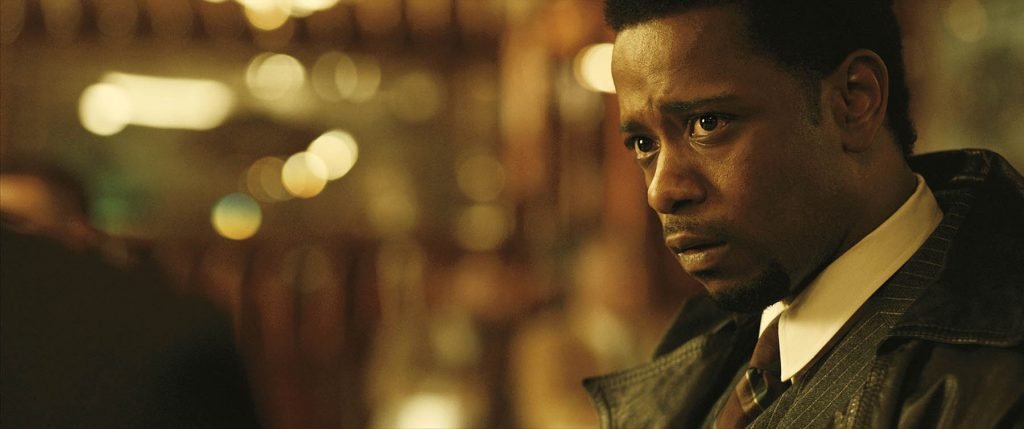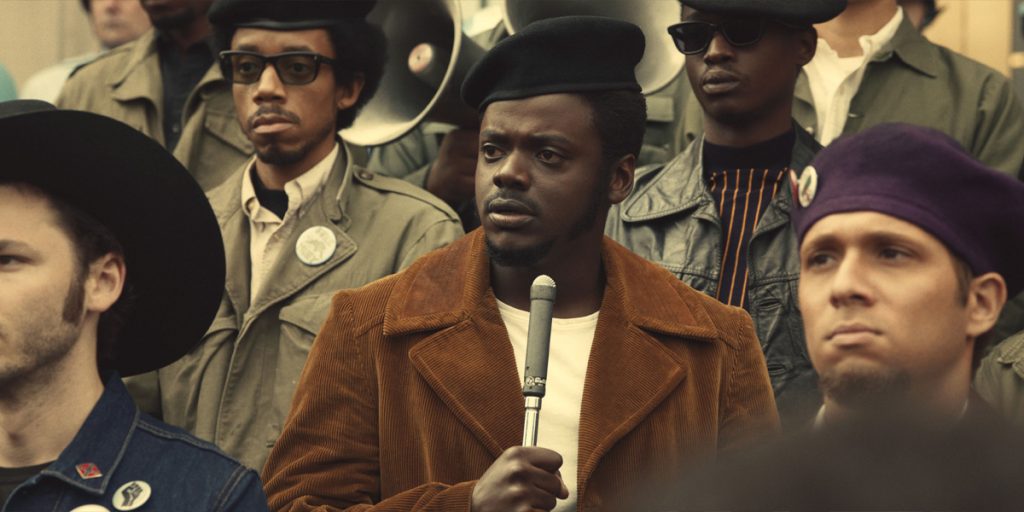In ferociously fiery fashion, Judas and the Black Messiah offers insight on a man and a movement that’s been overlooked in history for far too long.
In schools across the country, as students are educated on the history of the civil rights movement, they are continually reminded of the importance and influence of African American icons like Martin Luther King Jr. and Malcolm X, but little time – if any – is spent speaking to the power of the Black Panthers and the formidable Fred Hampton, the chairman of the party’s Illinois chapter. To say this is a shortcoming of the American education system is an understatement – it’s an outrageously unacceptable oversight.
In order to make conversations of these “controversial” social matters as “safe” as possible, schools have shied away from recognizing the work of these “radical” revolutionaries, especially due to the misinformation campaigns in the 60s that tagged them as “terrorist organizations” – a distinction that has sadly stuck to this day. Thankfully, Shaka King’s Judas and the Black Messiah is here to set the story straight. In wholly authentic, visually arresting, and emotionally affecting fashion, this blistering biopic brings the truth of the Black Panther Party to audiences around the world – and it takes no prisoners in this pursuit.
Judas and the Black Messiah picks up as petty criminal William O’Neal (Lakeith Stanfield, of Uncut Gems and Knives Out) is apprehended by police after a botched carjacking, only to be subsequently offered an opportunity to avoid further jailtime by the FBI – infiltrate the Black Panther Party (BPP) and work as an informant for the U.S. government. Though O’Neal is suspicious to start, thanks to some palpable pressure from the feds, he eventually succumbs to their sway to eschew his prison sentence, making his “deal with the devil” and agreeing to assist these institutions in their efforts to eradicate the BPP.
Whilst “on the inside,” Jesse Plemons’ (I’m Thinking of Ending Things, The Irishman) Roy Mitchell serves as O’Neal’s main contact, and FBI director J. Edgar Hoover (Martin Sheen, of Apocalypse Now and The Departed) wages political war on these “belligerent” Black Panthers, who he believes stand a threat to American society as we know it. However, as O’Neal becomes closer and closer to the chairman of the Illinois Black Panther Party, Fred Hampton (Daniel Kaluuya, of Get Out and Black Panther), he starts to grow skeptical about going through with his “schemes.” While watching the Panthers admirably and actively assist the Black community at large, O’Neal realizes that they aren’t the “traitorous” treasonists they’ve been made out to be by the government, and he comes to genuinely care for his comrades. In the end, can he truly do what’s been asked of him and ultimately betray his brethren?

As director and co-writer (alongside The Mighty B!’s Will Berson, in his first script for a feature film), Shaka King’s creative vision is instantly clear as soon as the film commences, as it radiates with a certain realism and authenticity that only someone with a true attachment to this material could manifest. King’s mightily muscular filmmaking in these first few scenes brings to mind the grit and the grime of 70s cinema, immersing audiences in this seedy story and setting the stage for the morally ambiguous anarchy that will soon take place. And, though not the primary focus of the narrative, he also stages action setpieces and staggering shootouts with an acute and astounding artfulness – one that feels as if it belongs to a filmmaker twice his age. His and Berson’s script is equally entrancing, as it takes a sledgehammer to the slander of the Black Panther Party and Hampton that has become commonplace in American culture and simultaneously highlights the hypocrisy and heinousness of the U.S. government throughout their struggles to sabotage this movement and essentially safeguard systemic racism.
King and Berson don’t beat around the bush here – as Judas and the Black Messiah doesn’t have the time to dabble in “delicacy” – and frankly, they shouldn’t have to. The film has two hours and six minutes to right the wrongs of years of deception and defamation, and it’s most definitely not going to miss any detail of this deceit, requiring viewers to reconsider the heroes and villains of this country’s history. The insight into Hampton’s congregation of his infamous Rainbow Coalition proves to be perhaps the most invigorating aspect of Judas and the Black Messiah. As we see Hampton honorably join arms with both the Puerto Ricans of the Young Lords and surprisingly even the white Southerners of the Young Patriots Organization, we grasp the full extent of his goals and realize why the government was so quick to snuff out his significance. If he could assemble an anti-capitalist, anti-police association of individuals from every race and every walk of life, they could’ve become an unstoppable force in American society – and in a country so resistant to change of any kind, we know exactly why this striking solidarity was met with scorn instead of support.
As our titular “Black Messiah,” King couldn’t have possibly found a more perfect fit for this towering figure than Daniel Kaluuya – an actor who not only astonishingly approximates Hampton’s aggressive authority but also rivetingly resurrects the indomitable icon in his entirety, blurring the line between fact and fiction with his larger-than-life portrayal. Every time he delivers one of Hampton’s signature speeches, he simply brings down the house with a scream that stirs the souls of his disciples and shakes the foundation of white supremacy in America. He believes every word he says as if he is Hampton himself, and as a result, you do too.
However, his performance isn’t merely all anger all the time – Kaluuya’s valiant versatility as an actor is on full display here, and he’s allowed to explore Hampton’s emotional depth without interference from King in any capacity. In fact, some of his most moving moments occur during his intimate interactions with Dominique Fishback’s (Project Power) Deborah Johnson, his long-time lover and the soon-to-be mother of his child, as the two dispute over his inability to balance his duties to both his family and to his coalition. It’s in these scenes that we see the man behind the messiah, and this captivating contrast makes Kaluuya’s wondrously well-researched and instantly iconic performance all the more impressive. There’s no mere mimicry to be found, only completely credible immersion.
As our “Judas” – and the yin to Kaluuya’s yang – Lakeith Stanfield delivers the best work of his career with his depiction of the double-crossing William O’Neal, a character who could’ve easily been a surface-level “snitch” in another actor’s hands, but one who Stanfield suffuses with candid complexity and masterful multidimensionality. Over the course of the film, Stanfield uncovers O’Neal’s increasing unease with stark sincerity, softly spotlighting the way his sham is eating away at his insides without ever letting these emotions spill onto the surface – and this strenuous strain is as painful for us to watch as it is for Stanfield’s O’Neal to endure. It’d seem almost impossible to sympathize with an individual who goes to these lengths to save his own skin no matter who he hurts along the way, but thanks to Stanfield’s perceptive personification of O’Neal, we at least come away better comprehending his chicanery, even if we can never agree with his actions.
Across the board, the rest of the ensemble is miraculously able to match Kaluuya and Stanfield’s explosive energy, with the aforementioned Fishback asserting herself as the standout of the supporting cast. She honorably handles Deborah’s dilemma of wanting to help out with Hampton’s mission while also striving to keep her future son’s father safe, and the torment of this tug-of-war is achingly apparent. Ashton Sanders (Moonlight), Algee Smith (Euphoria), and Dominique Thorne (If Beale Street Could Talk) are just as effective as other prominent Black Panthers in Hampton’s posse, while Plemons’ Roy Mitchell offers a compelling look at white complicity – the ally who claims to be “all for” civil rights but has no problem watching those he works for turn to force when Black people start asking for “too much, too soon.”
Thanks to the commendable commitment of every member of the cast and crew in their pursuit to pay homage to the legacy of Fred Hampton, Judas and the Black Messiah is ferociously fiery feat of filmmaking that is bound to be utilized as an incomparable historical artifact for years to come. Yet, we need not wait for its weight to sink in, as its release is relevant now more than ever after America has only just escaped a racist regime of stunning scale, and a summer of pain and protest publicized the still significant issues of systemic inequality. As opposed to silencing those who shed a light on these troubles, both the prominent protestors of today and movies like Judas and the Black Messiah make it clear that the only path to progress for this country is radical reform – and anything less only assures that additional societal anguish will await.
Judas and the Black Messiah premiered online, at the 2021 Sundance Film Festival, on Monday, February 1, 2021. The film was released in US cinemas and on HBO Max on February 12, 2021.

